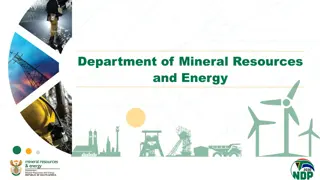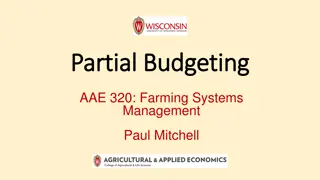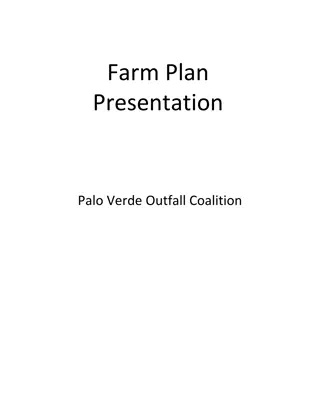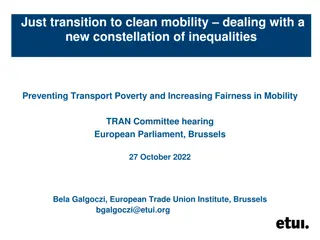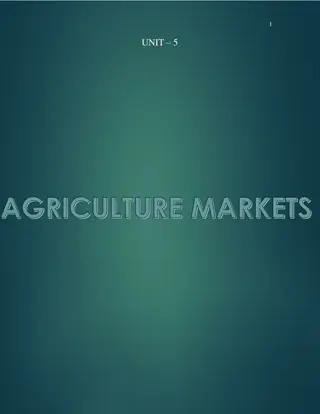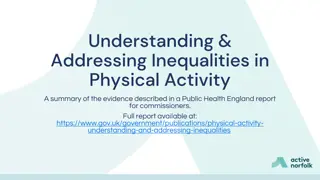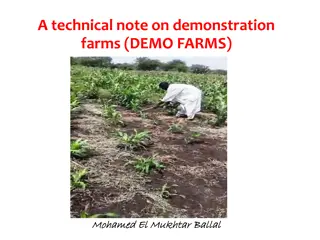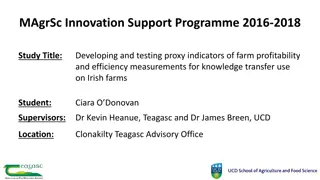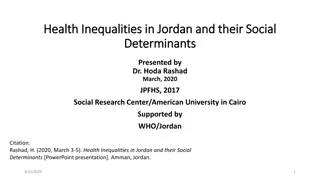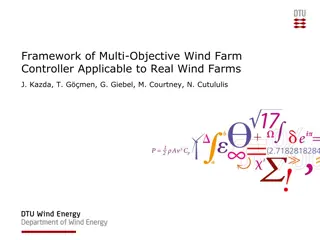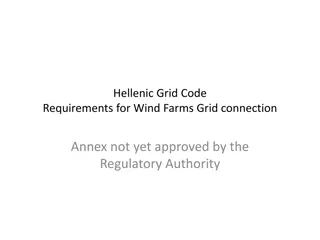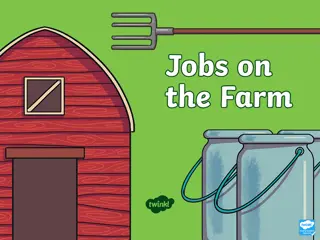Addressing Inequalities in Access to Basic Services for Farm Dwellers on Commercial Farms - AFRA Presentation
AFRA presents strategies to address inequalities in accessing basic services for farm dwellers living on commercial farms. The presentation covers the context, legal framework, litigation, and engagement with municipalities to ensure rights violations are managed effectively and secure tenure and service access for farm dwellers in the long term.
Download Presentation

Please find below an Image/Link to download the presentation.
The content on the website is provided AS IS for your information and personal use only. It may not be sold, licensed, or shared on other websites without obtaining consent from the author.If you encounter any issues during the download, it is possible that the publisher has removed the file from their server.
You are allowed to download the files provided on this website for personal or commercial use, subject to the condition that they are used lawfully. All files are the property of their respective owners.
The content on the website is provided AS IS for your information and personal use only. It may not be sold, licensed, or shared on other websites without obtaining consent from the author.
E N D
Presentation Transcript
Addressing inequalities in access Addressing inequalities in access to basic services in the context to basic services in the context of farm dwellers living on of farm dwellers living on commercial farms commercial farms AFRA presentation draft, 28thFebruary 2019 SALGA 2019 research colloquium March 2019
Overview of presentation 1. Introduction to AFRA and the Pathways Project, including our strategy on services 2. Context 3. Constitutional and Legal Framework 4. Litigation 5. Engagement with municipalities
Introduction to AFRA The Association for Rural Advancement (AFRA) Land rights non-government organisation UMgungungdlovu District Municipality, Kwa Zulu Natal Multi-faceted approach to our work, includes acting on violations on commercial farms that are reported by farm dwellers Often include cutting off access to services as a constructive eviction attempt by farm owners Strategic litigation is another element of the work and is used to compel municipalities to provide basic services, as stipulated in the Constitution Engaging with municipalities in a range of different ways to ensure improved access to services is another example of our approach
PATHWAYS OUT OF POVERTY FARM DWELLERS DRIVE PROCESS COUNT FARM DWELLERS IN MANAGING RIGHTS VIOLATIONS MANAGING RIGHTS VIOLATIONS CHALLENGE: CHALLENGE: PUTTING FARM DWELLERS ON THE MAP SECURE TENURE & ACCESS TO SERVICES IN THE LONG TERM GOVERNMENT STRATEGIES LANDOWNER STRATEGIES
Context Most farm dwellers lack access to basic services such as water and sanitation, despite constitutional rights, and land reform has failed to deliver on the promises contained in the post-1994 legal dispensation. Some of the constraints to access to services include: the significant resource and capacity constraints of district municipalities, which is where responsibility for water services resides; perceptions that the state cannot provide services on land that is privately owned as is the case with the commercial farms on which farm dwellers live; in some cases the reluctance of private owners to permit access to farms for municipalities who wish to provide services, especially electricity.
Constitutional and Legal Framework Local and District municipalities are constitutionally and statutorily obliged to take reasonable measures to provide the residents with the minimum prescribed standards of basic water supply and basic sanitation set out in the Regulations to the Water Services Act The local and district municipalities are obliged to include plans and strategies in their Integrated Development Plans for improving lives of farm occupiers and labour tenants.
Right of Access to Basic Services The Constitution enshrines a variety of socio-economic rights associated with farm dwellers in the Bill of Rights, including the promotion of tenure security to previously disadvantaged persons, the right of access to adequate housing and the right of access to adequate water, food and health care. The state is obliged to "respect, protect, promote and fulfil" these rights. The Constitution also places a number of duties on local government to provide essential services. These rights and legal duties are the most important constitutional provisions related to farm dwellers.
Fundamental rights A number of other fundamental rights contained in the Constitution are closely related to these provisions. These include the rights to human dignity, privacy, education, healthcare and the rights of children. These rights may also be adversely affected by the tenure arrangements and living conditions on farms.
Socio-economic rights Socio-economic rights are rights that guarantee state-supported entitlements to tenure security, housing, heath care services, education, social security and a range of other social goods. These rights are traditionally distinguished from civil and political rights. Socio-economic rights do not provide for immediately claimable rights. Instead, these rights require the state to adopt and implement a reasonable programme to progressively realise these rights within available resources. The South Africa Constitution is one of only a few that provide for justiciable socio-economic rights (in other words, the socio-economic rights can be enforced by the courts).
Food and Water Section 27(1) Everyone has the right to have access to - (a) health care services, including reproductive health care; (b) sufficient food and water; and (c) social security, including, if they are unable to support themselves and their dependents, social assistance.
Food and Water Section 27(2) Limits the application of 27(1) the state must take reasonable steps to progressively realise these rights within available resources the content of the rights to water and food are therefore dependent on the reasonableness of the programmes or policies which the state adopts to give effect to these rights.
Sanitation The right to sanitation is enshrined in section 24 of the Constitution as a right to an environment that is not harmful to health and well- being; municipalities must ensure the realisation of this right. Section 26 of the Constitution specifically grants everyone the right to have access to adequate housing which has been interpreted to include sanitation.
Electricity The Constitution does not include a provision that expressly entitles people to electricity. But, municipalities are under an obligation to provide electricity to those within its area of jurisdiction: the Constitutional Court: local government bears a responsibility to provide electricity as a matter of public duty (Mkontwana) electricity is an important basic municipal service which local government is ordinarily obliged to provide (Joseph)
Responsibility of local government Local government carries the central mandate for ensuring that people within its area of jurisdiction are provided with basic municipal services, including water, electricity and sanitation. Section 152(1) sets out the objects and an overarching set of obligations for local government. to ensure the provision of services to communities in a sustainable manner and to promote social and economic development in communities within their areas. Section 153 of the Constitution saddles municipalities with a number of key development duties. In particular, section 153(a) municipalities are obliged to prioritise the social and economic development of the community . And to give priority tothe basic needs of the community,
The Water Services Act 1997 Legislates the municipal function of providing water and sanitation services. Defines basic sanitation as the prescribed minimum standard of services necessary for the safe, hygienic and adequate collection; removal, disposal or purification of human excreta; domestic waste-water and sewage from households, including informal households . Provides for the setting of national standards and norms regarding water services and creates an obligation for water services authorities to ensure efficient, affordable, economical and sustainable access to water services . Water services are defined as water and sanitation. water services authorities are all metropolitan and district municipalities and authorised local municipalities Provides for the rights of access to basic water supply and sanitation needs, a regulatory framework for water service providers, and financial assistance to water service providers.
The White Paper on Basic Household The White Paper on Basic Household Sanitation (2001) Sanitation (2001) The policy focuses specifically on the provision of a basic level of household sanitation to mainly rural communities and informal settlements. It prioritizes the provision of a basic level of household sanitation to those facing the greatest health risks due to inadequate sanitation and cannot afford to meet their own requirements. It affirms that local government has the constitutional responsibility to provide access to sanitation services, and that provincial and national government have a constitutional responsibility to support local government in the provision of these services. The policy notes the importance community participation in the conceptualisation, selection, planning, design, implementation, operation and maintenance of all projects that community members should be involved in the decision making process. The White Paper defines the minimum acceptable level of sanitation as: (a) appropriate health and hygiene awareness and behaviour; (b) a system for disposing of human excreta, household waste water and refuse, which is acceptable and affordable to the users, safe, hygienic and easily accessible and which does not have an unacceptable impact on the environment; and (c) a toilet facility for each household.
The Water Services Act National Norms and The Water Services Act National Norms and Standards for Domestic Water and Sanitation Standards for Domestic Water and Sanitation Services (2017) Services (2017) Mandated in Sections 9 and 10 of the Water Services Act (1997). Set minimum standards for access to water and sanitation. Stipulate the requirements with which sanitation facilities and infrastructure shall comply. Set the minimum basic standard for the provision of water at 25 litres per person per day, or 6,000 litres per month to a household and the provision of uninterrupted access to an adequate, appropriate, sanitation facility. The standards define pit toilets without a slab or platform or vent pipe, bucket toilets, chemical toilets (unless used in a temporary or emergency situation), and open defecation as unimproved sanitation facilities. These norms apply to the provision of sanitation services on privately owned land as well as on publically owned land.
Regulations Relating to Compulsory National Standards and Regulations Relating to Compulsory National Standards and Measures to Measures to Conserve Water (Government Notice R509 in Government Conserve Water (Government Notice R509 in Government Gazette 22355 of Gazette 22355 of 8 June 2001) ( the Regulations ) 8 June 2001) ( the Regulations ) the minimum standard of basic water supply and basic sanitation for the purposes of the Water Services Act is set out in the Regulations. Regulation 2 provides as follows The minimum standard for basic sanitation services is (a) . . . (b) a toilet which is safe, reliable environmentally sound, easy to keep clean, provides privacy and protection against the weather, well ventilated, keeps smells to a minimum and prevents entry and exit of flies and other disease- carrying pests
Regulation 3 provides as follows The minimum standard for basic water supply services is (a) . . . (b) a minimum quantity of potable water of 25 litres per person per day or 6 kilolitres per households per month (i) at a minimum flow rate of not less than 10 litres per minutes; (ii) within 200 metres of a household; and (iii) with an effectiveness such that no consumer is without a supply for more than seven full days in any year.
Litigation Ongoing and persistent failure to provide the farm occupiers and labour tenants who are residing within areas of their jurisdiction with access to basic sanitation, sufficient water and collection of refuse is inconsistent with the Constitution. Failure to take a decision to provide the farm occupiers and labour tenants within the areas of their jurisdictions with access to basic sanitation, sufficient water and collection of refuse. Failure to prioritise the rights of occupiers and labour tenants in their independent development plans. LMs and DMs. A monumental failure by the local and district municipalities to provide basic services to farm occupiers and labour tenants. The farm occupiers and labour tenants are vulnerable members of the society who are residing on farms not because of their own choice but due to past racially discriminatory laws.
Engagement with municipalities Learning event in 2017 Services Dialogue in 2017 Learning Event in 2017 Services Dialogue in 2018 Services focus group in 2019 Learning event in 2019 Ongoing responses to rights violations
Engagement with municipalities Identification of blockages and constraints: Provision on privately owned land Consent of land owners Economic and financial pressures experienced by farmers Power dynamics on farms and vulnerability of farm dwellers Financial and capacity constraints of municipalities Responsibility for and costs of operations and maintenance
Engagement with municipalities: what have we learned? Information dissemination Test cases we need to demonstrate success Two instruments ESTA amendment compensation of land owners WSDPs, IDPs, by laws, water services intermediaries MoUs agreements by landowners to service on behalf of municipalities Action road mapping





